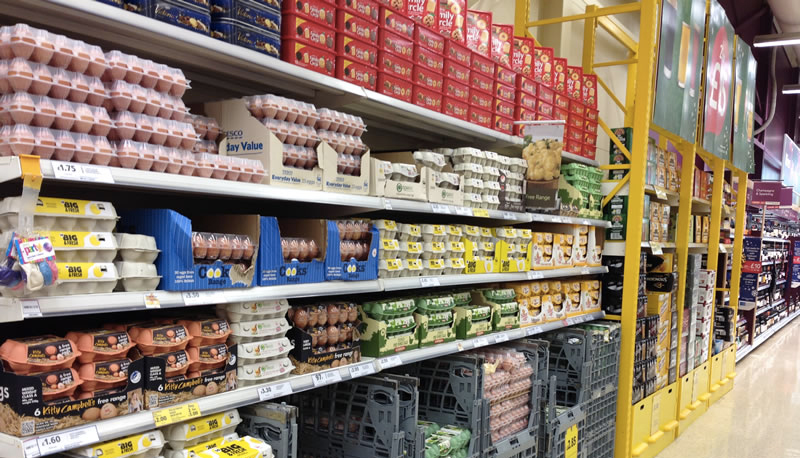
Sales of organic products increased by 4% in 2014 amidst a significant reduction was seed in both food prices and food spending.
Shoppers spent an extra £1.4 million a week on organic products and the organic market exceeded £1.86 billion, bringing sales back to levels in 2009. Growth in sales across Soil Association Certification symbol holders increased by 7.7%.
The area of agricultural land certified organic in Scotland has fallen to 2.6%, compared to the UK average of 3.3%.
There has also been a 9.8% decrease in the number of producers to 404, though this decline is set to slow when new figures are released this summer. New support under the CAP for organic conversion and maintenance encourages Scottish producers to be cautiously optimistic about the prospects for revival.
The organic sector is a national priority in Scotland, with the Scottish Government continuing to be supportive of Scotland’s organic sector by working alongside the organic industry to refresh the Organic Futures action plan in 2015.
Dairy products and fresh fruit and vegetables were the most popular organic purchases in the Scotland according to Kantar data and in the UK according to Nielsen.
Overall, the strongest UK national market growth was through online shopping and box schemes (11.7%) and independent retailers (5.7%) which offer the choice and convenience of extensive organic ranges in one place.
More than a quarter of UK spending on organic products (27.9%) is in the dairy aisles with yoghurt sales increasing by 13.8% and dairy sales increasing by 6.5% -a stark contrast to the 3% contraction of the non-organic dairy market. Nationally, UK sales of organic eggs and poultry were up 15.8% and 8.2%, while non-organic sales dipped by 6.2% and 3.3% respectively.
Laura Stewart, Director at Soil Association Scotland said; “This UK Organic Market Report shows promising signs for Scottish organic producers supplying the growing UK market.
"Anecdotally, however, the picture is mixed in Scotland, with some organic businesses thriving, and others finding trading conditions challenging. We still have a long way to go to reach the potential we see being realised in other countries. Although organic dairy in Scotland and the UK is doing well, in Denmark, there is a 30% market penetration for organic milk.
"We need support from both Scottish and UK governments and the multiple retailers to encourage both supply and demand of organic products in Scotland. This is vital in order to realise the multiple benefits provided by organic production for our health, our environment and our economy.”
Speaking about the organic market in Scotland, Darren Campbell of Whole Foods, Giffnock said; “This past year showed solid growth in organic and local categories. Our customers are both more interested and more educated regarding healthy choices and so far, 2015 has shown a continuation of this trend.”
Across the UK, nearly one third (29%) of shoppers are seeking out ethically sourced and environmentally friendly products and over two thirds (68%) making the choice to support local farmers and businesses, the organic sector allows consumers to make more sustainable choices, with over 83% of UK households purchasing organic products in 2014.
Feedback from retailers indicates that shoppers are becoming more health conscious and organic products offer answers to questions about food quality and provenance. Nutritional credentials of organic received a significant boost in July 2014 when landmark nutritional research from Newcastle University showed organic crops and crop-based foods (including fruit, vegetables and cereals) are up to 60% higher in a number of key antioxidants compared to non-organic.
There were also sharp increases for a wide range of other products in the UK against a background of sliding non-organic sales including fresh fruit (up 6.4%), tea (up 13.7%), cereals (up 4.2%) and biscuits (up 7.2%). While sales of organic vegetables fell by 2%, but in a context in which non-organic sales plummeted at five times this rate.
There was also significant growth in organic supply into catering, (13.6%), reflecting dynamic growth of the Soil Association’s Food for Life Catering Mark in schools, workplaces and hospitals - the market exceeded £1 million a week for the first time and is now worth £55.8 million. Health and beauty (up 20%) and textile (up 3.4%) sectors also grew in 2014.
Innovation is helping drive growth, with the organic sector investing strongly in marketing and new product development. 2014 saw more organic versions of established brands, organic recipe boxes for busy occasion shoppers and wholesalers selling direct via mainstream online shopping outlets. The organic sector is embracing innovation in a changing retail landscape with brands adding new and innovative products, keeping customers interested in the sector. The mood among organic business is confident with 63% predicting growth in 2015 and six out of ten of these (62%) anticipating double-digit growth.
Andrew Burgess, Director of Agriculture of the Produce World Group, said: “The continuous growth of organic products, despite numerous challenges in the retail environment, highlights the strength of the organic sector in providing new innovative products to new customers. The organic sector and Produce World are embracing the current retail challenges and investing strongly in marketing and new organic product development. This has been reflected in the growth of organic products being sold through online shopping channels and box schemes, such as our Nature’s Premium brand of vegetable boxes.”
“As one of the UK’s leading organic growers, we know from our own figures that more people are buying organic, with taste and quality being big reasons behind this consumer trend. We want to continue playing a part in the growth of organic products by showing that top quality, great tasting and good looking organic vegetables are available all year round for any occasion.”
